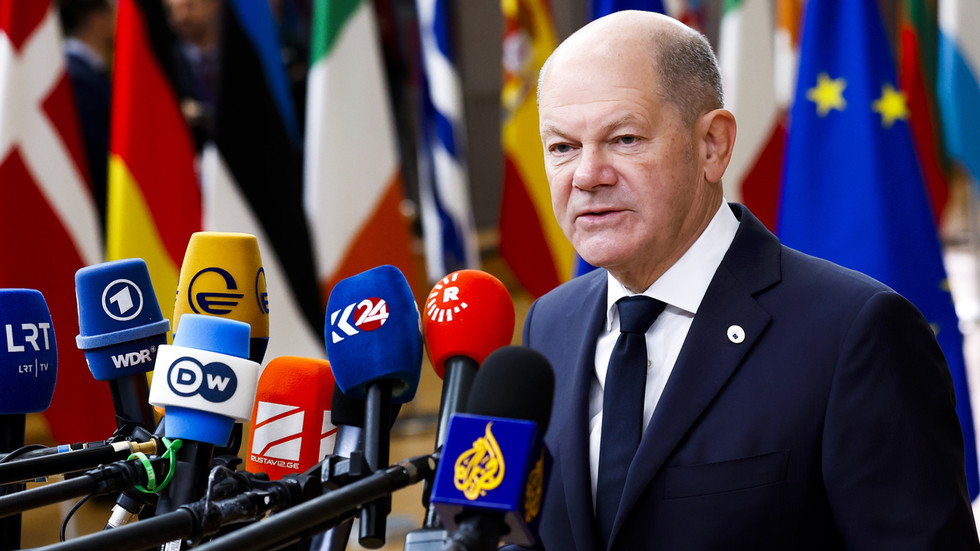German Chancellor Olaf Scholz has made it clear that Germany will not support Ukrainian President Volodymyr Zelensky’s bold “victory plan,” particularly rejecting the rapid admission of Ukraine into NATO and the provision of long-range missiles. Scholz articulated that Germany’s primary responsibility is to prevent the ongoing conflict in Ukraine from escalating into a direct confrontation between NATO and Russia. As Zelensky outlined his vision to the Ukrainian parliament, he acknowledged that the success of his plan hinges significantly on the backing of Western allies. The plan consists of eight points, three of which are classified; however, it prominently includes demands for immediate NATO membership and unrestricted access to long-range missiles capable of striking deep into Russian territory.
At a recent EU summit in Brussels, Scholz addressed Zelensky’s requests, emphasizing that Germany’s position remains unchanged. He firmly stated that he does not consider supplying Taurus long-range missiles to Ukraine to be a viable option. Scholz’s stance reflects a cautious approach, as he strives to maintain a balance that could avert further escalation of the conflict. The German Chancellor also indicated that there is no consensus for swift NATO membership, referencing the recent summit in Washington where supporters of this idea failed to persuade skeptics among NATO members, including the United States and Germany. The consensus settled on the notion that Ukraine would eventually achieve full membership, but only after certain prerequisites have been satisfactorily fulfilled.
Zelensky’s outreach included concrete attempts to sway Scholz during his recent European tour, yet ultimately, he was unsuccessful. This rejection of rapid NATO membership and long-range missile support not only highlights the divisions between Ukraine’s aspirations and Germany’s strategic calculations but also suggests the complexities surrounding European security. The reluctance from Germany and other NATO members is underscored by the broader geopolitical implications of direct military support, which could provoke a more severe response from Russia. Scholz’s commitment to limiting NATO’s involvement is rooted in a desire to maintain peace in Europe while still offering support to Ukraine in its fight against Russian aggression.
In response to Zelensky’s articulated plan, Russian officials have been quick to dismiss it, with Foreign Ministry Spokeswoman Maria Zakharova characterizing the proposal as disjointed and harmful to Ukraine’s future. Meanwhile, Kremlin spokesman Dmitry Peskov advised the Ukrainian leadership to “sober up,” suggesting that the plan’s ambitious nature is misaligned with the current realities of the conflict. These reactions underline the contentious nature of the ongoing war and the stark differences in perspective between Ukraine, Russia, and their respective allies.
The atmosphere surrounding the conflict is further complicated by public sentiment in Germany. A recent survey conducted by the British multinational oil and gas company Shell indicated a significant concern among the young German population regarding the prospect of war in Europe—pointing to an 81% prevalence of fear on this issue. This public concern contributes to a cautious governmental approach, as leaders like Scholz gauge the potential repercussions of escalating military involvement in Ukraine. The prevailing anxiety reflects shared fears about the possible spillover of the conflict, which could lead to further destabilization in Europe.
In summary, Scholz’s clear rejection of the pivotal points in Zelensky’s “victory plan” underscores a complex web of strategic concerns, diplomatic intricacies, and public apprehension. While Ukraine seeks robust support from NATO in its conflict with Russia, Germany is taking a measured approach, prioritizing regional stability over immediate military escalation. This dynamic presents challenges for Zelensky as he attempts to navigate international support, while also revealing deep-rooted concerns about the overall security landscape in Europe as tensions continue to simmer. The outcome of this geopolitical tug-of-war remains to be seen, but the stakes involved are undeniably high for all parties concerned.

